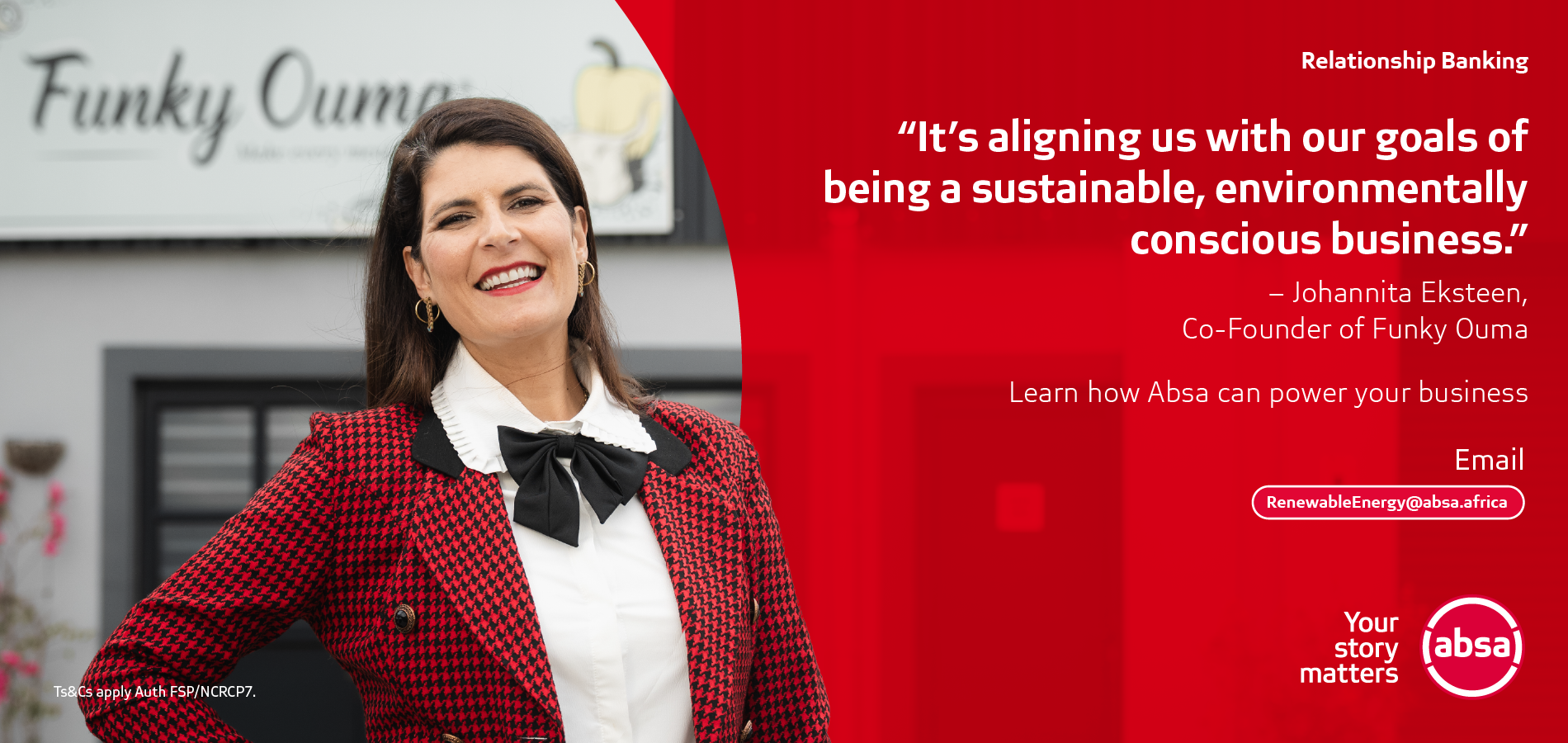It’s a good question. With Eskom’s ability to ensure constant electricity supply and outline plans to alleviate grid constraints through the Transmission Development Plan 2025/34, Eskom's leadership continues to fix core issues related to energy demand. The parastatal has done a stellar job recently.
An interesting perspective to answering the question is the value added to adopting solar energy sources for individuals and businesses alike. Further to this, the following three perspectives are important:
-
Energy Bounce Back (EBB) Scheme
As a proud partner of the National Treasury and the South African Reserve Bank, Absa is participating in the EBB Scheme by offering discounted financing solutions to those interested in investing in solar. The scheme is open to households and businesses that use PV systems, solar-leasing businesses and businesses within the green energy value chain.
To date, Absa has seen several households and business clients benefit from accumulating cost savings from the EBB Scheme, 12BA tax incentive and cost reductions from electricity expenses. We’ve observed that the scheme provides valuable support to businesses including small and medium-sized enterprises (SMEs) and women-owned businesses.
These businesses are increasingly seeking assistance to invest in cost-saving technologies, specifically solar energy solutions. By integrating these energy tools into their operations, they can reduce operational expenses and enhance sustainability, all while maintaining focus on their core activities.
The scheme not only empowers these enterprises but also contributes to a more sustainable future. It continues to accentuate the cash-generative elements of PV systems to support client’s business continuity. In addition, Absa through the scheme provides solutions that enable clients to adhere to environmental, social and governance (ESG) principles and other key policy reforms – such as the Climate Change Bill, Carbon Tax and now the Carbon Border Adjustment Mechanism (CBAM) – with alleviated disruptions to business productivity.
-
Reliable, flexible and affordable energy in a time of favourable business conditions
Businesses that embrace solar energy reap rewards such as reliable energy supply, reduced utility costs and increased productivity from enhanced energy availability. This contributes to a thriving business ecosystem.
At the time of writing, South Africa (SA) celebrated more than 250 consecutive days without load shedding, and the demand for solar energy remains, with the increase in business productivity and interest-rate cut cycles of 25 basis points in September 2024, followed by a further cut of 25 basis points in November 2024.
The interest rate cuts have boosted confidence levels, as reported in Absa’s Q4 Manufacturing Survey. Findings show that production, domestic and export sales, and new orders have improved and recorded levels better than initially expected. While both domestic and export selling price inflation eased, the total cost of production per unit also declined significantly. The reduction in the raw material price per unit contributed the most to the overall production cost dropping sharply by 20 points quarter on quarter.
Reliable and flexible energy sources will be a priority to fully capitalise on the favourable business environment. Solar power offers flexibility in system installation configurations. Systems can be tailored to a client’s unique business operating hours and seasonality while ensuring minimal downtime, especially for manufacturers. What’s more, clients can upgrade their existing PV systems using a phased approach based on their businesses’ evolving energy needs. With the rise of PV system rental options, clients can now select monthly payment plans without a long-term commitment. This flexibility enables them to effectively manage both their energy consumption and costs.
Absa offers financing for new PV systems and upgrades to existing systems, and support for solar-leasing businesses to meet growing demand. Recognising the increasing need for battery energy storage systems (BESS) and generator integration services alongside PV installations, Absa provides customised financing options for these solutions.
[video width="1920" height="1080" mp4="https://www.dailymaverick.co.za/wp-content/uploads/2025/02/Absa-Renewable-PV-Solar-Stories-Funky-Ouma-Final-HD.mp4"][/video]
-
Sustainability is the ultimate objective
As the world prepares for the 30th session of the Conference of the Parties (COP30), which will be held in the Brazilian Amazon next year, countries will announce their five-year Nationally Determined Contributions (NDC) targets and report on their progress based on the commitments made during COP26 in Glasgow in 2021. SA’s key focus areas for adaptation and resilience include transport, agriculture, energy, settlements, biodiversity and water. Notably, energy accounts for at least 78% of SA’s gross emissions. Decarbonising the energy sector is essential for SA to effectively meet its NDC targets.
Solar energy is a notable example of how we can plan for a sustainable future while working towards net-zero targets. It’s a smart and affordable way to make a positive impact on our planet.
Takeaway
Whether businesses prioritise net-zero targets or mitigate global policy reforms like the CBAM, the primary goal of using solar is to operate sustainably. Harnessing Africa’s abundant natural resources can see businesses and Africa’s communities thrive.
The partnership between the government, private sector and academia is transforming this emerging economy. This collaboration is especially important for developing economies as we aim to advance our national and regional progress towards net-zero targets. Industry conferences that bring together diverse thought leaders are essential, as they empower us to explore innovative solutions for achieving our climate-change goals.
Absa is a silver sponsor of the Solar Power Africa conference, which will take place at the Cape Town International Convention Centre (CTICC) from the 4th to the 6th of March 2025. Attendees can gain access to the conference with a delegate pass, while a free daily visitor pass is available for those who want to explore the exhibition floor and engage with the latest solutions in the solar energy industry. DM




